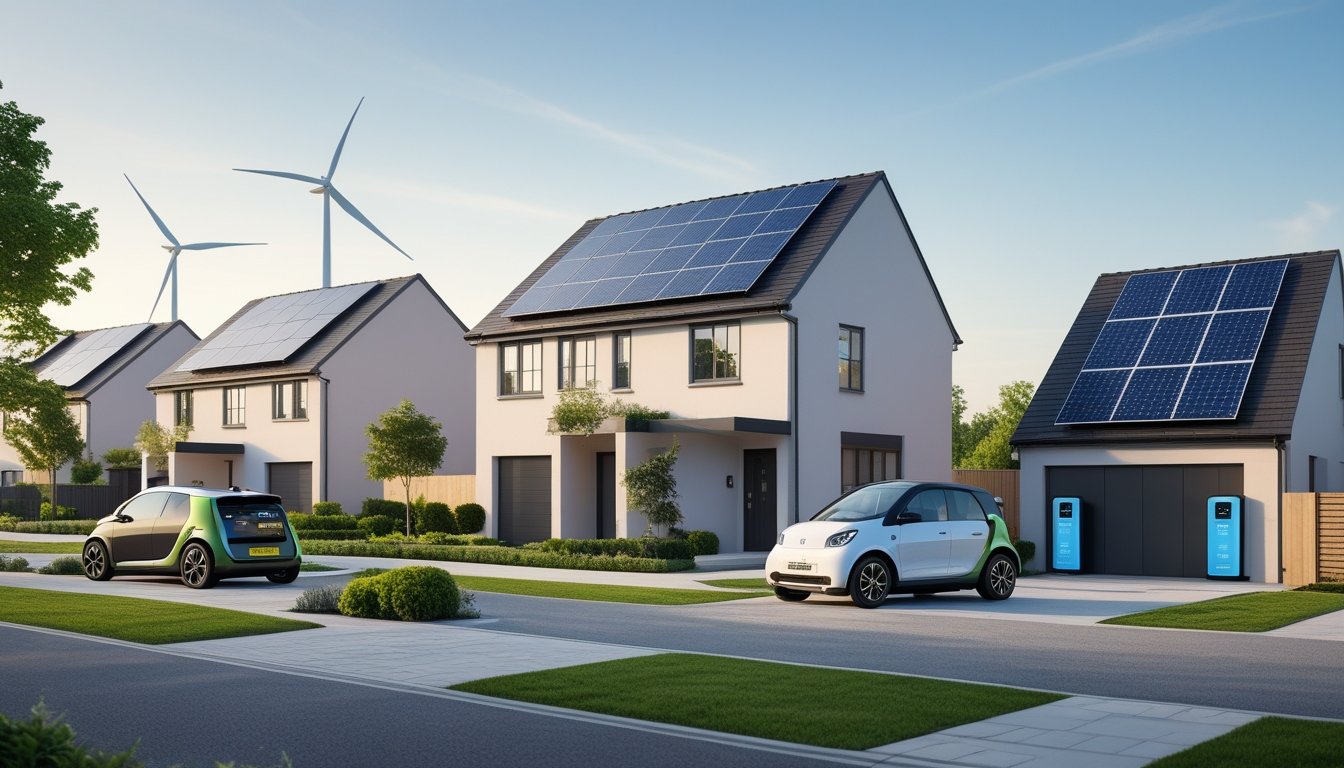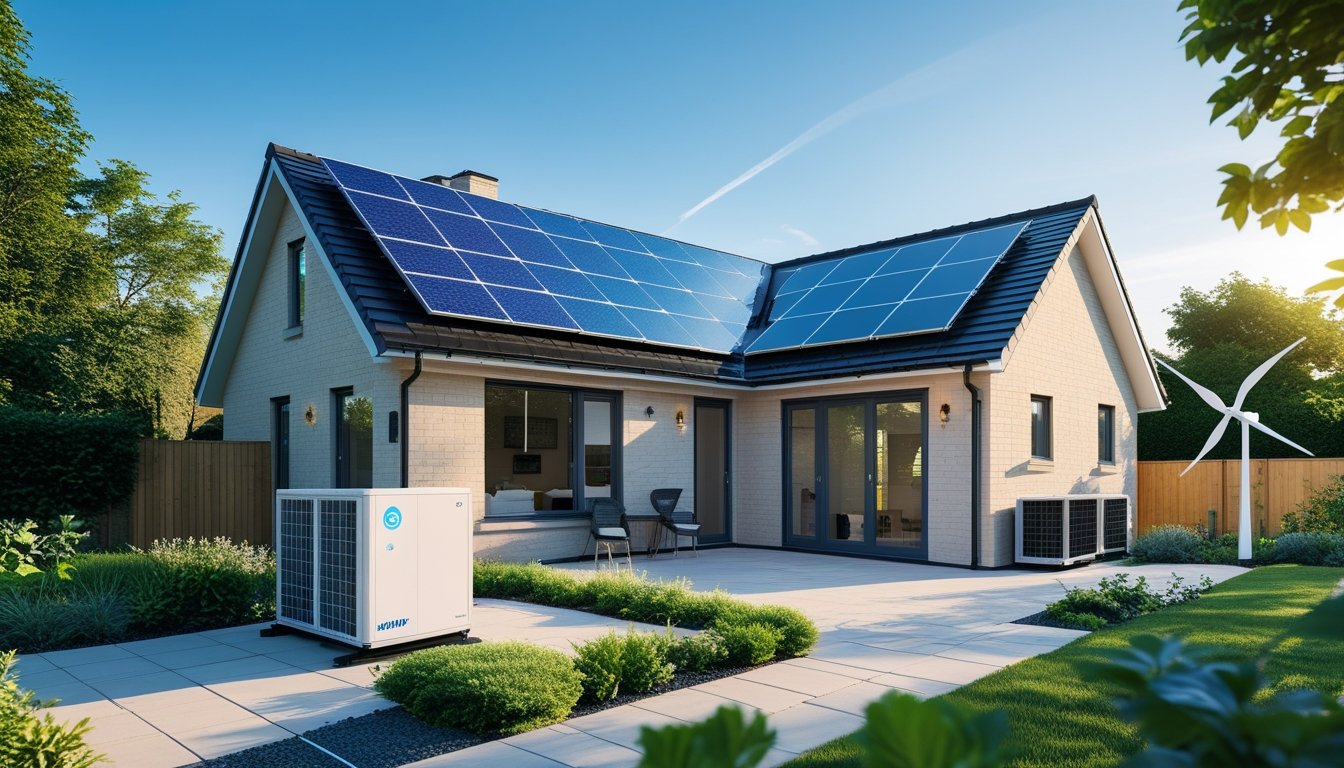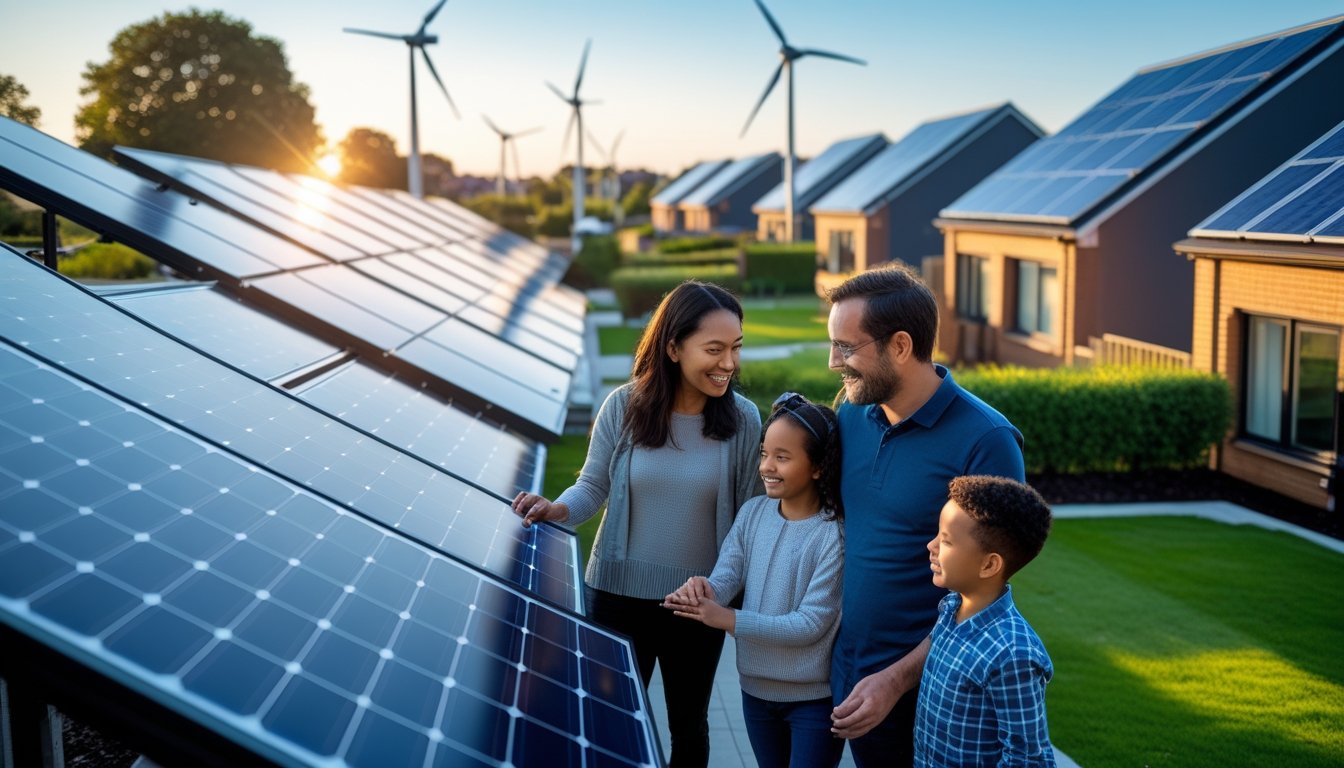Late updated: 24 Jun 2025 08:06
Written by: Eleanor Hartman
Innovative Sustainable Energy Solutions for UK Homes: Leading Practices and Technologies
In a world growing ever more conscious of its carbon footprint, the shift towards sustainable living is not merely a trend but a necessity. As energy costs rise and environmental challenges become more pressing, we find ourselves exploring innovative and sustainable energy solutions for homes across the UK. Harnessing renewable energy sources such as solar panels and smart heating systems can significantly reduce energy bills and contribute to a greener planet.

We are witnessing an exciting transformation in how we power our homes, thanks to advancements in energy-efficient technologies. UK households are increasingly pivoting towards solar installations and smart thermostats, which offer not only cost savings but also a substantial reduction in carbon emissions. These solutions provide the dual benefit of environmental sustainability and economic efficiency, making them an attractive option for homeowners.
As we continue to adopt these green technologies, it's crucial to stay informed about emerging trends and practical considerations. Understanding the possibilities and limitations of these innovations will guide us in making informed decisions that align with both our environmental values and economic interests.
Key Takeaways
- Sustainable energy solutions are vital for reducing energy costs and carbon emissions.
- Emerging technologies include solar panels and smart heating systems for UK homes.
- Informed choices enhance both sustainability and economic benefits.
Fundamental Sustainable Energy Solutions for UK Homes

We explore effective measures to enhance domestic energy efficiency and sustainability in the UK. Solar panels, advanced heat pumps, and battery storage solutions play pivotal roles in promoting sustainable living and energy independence.
Solar Panels and Photovoltaic Technologies
Solar panels convert sunlight into electricity, making them a cornerstone of green energy. Photovoltaic (PV) technologies include both monocrystalline and polycrystalline panels, with bifacial panels gaining traction for their ability to catch light on both sides. Installing high-efficiency solar panels can significantly reduce our carbon footprint.
Correct installation is crucial for optimal performance. Solar panel installations should consider panel orientation and shading. The energy savings from solar power systems often justify the initial cost. This aligns with our goal of achieving energy independence by sustainably harnessing solar energy, contributing positively to a sustainable future.
Advanced Heat Pumps and Heat Loss Reduction
Heat pumps extract heat from external sources such as air or ground and convert it for home heating. Ground source heat pumps are particularly effective due to the stable ground temperature, delivering consistent energy efficiency. Using eco-friendly materials for insulation can dramatically reduce heat loss, vital for maximising system efficiency.
Advanced heat pumps offer a sustainable alternative to traditional heating methods. By decreasing reliance on fossil fuels, these systems support our journey towards a cleaner environment. Prioritising heat pump technology aligns with our objectives of enhancing energy efficiency and reducing our carbon footprint.
Battery Storage Solutions for Maximum Efficiency
Battery storage solutions, such as the Tesla Powerwall, are essential for maintaining maximum efficiency in energy management. These systems store excess electricity generated from renewable sources, ensuring continuous power availability and reducing grid dependency. Energy storage solutions enhance renewable energy's reliability.
Integrating such solutions in our homes ensures we make the most of generated energy, further supporting energy independence. Efficient utilisation of battery storage aligns with environmental goals and offers significant energy savings, reinforcing the sustainability of our home energy systems.
Renewable Energy Integration and Grid Innovations
Integrating renewable energy solutions into the UK's grid is essential for a sustainable future. Renewable energy projects play a central role in modernising energy infrastructure with renewable technologies. These projects support our ambition to incorporate clean energy into everyday use.
Innovations such as smart grids facilitate direct consumer control over energy usage. Transitioning to these systems can enhance overall energy efficiency and make domestic energy consumption more eco-friendly. Achieving efficient renewable energy integration is paramount for the UK's energy solutions endeavour, and for supporting our environmental objectives.
Emerging Trends and Practical Considerations in Sustainable UK Home Energy
Sustainable energy solutions for homes in the UK are evolving with notable trends and considerations. Among these are government incentives that support renewable energy adoption, advanced EV charging infrastructure, community solar projects, strategies for reducing carbon emissions, and expert guidance on sustainable home upgrades.
Government Incentives and Energy Procurement Options
The UK government offers several incentives to encourage the use of renewable energy in households. Examples include the Green Homes Grant and Feed-in Tariffs. These programmes aim to decrease overall energy consumption.
Homeowners can explore energy procurement options such as green tariffs, which ensure electricity is sourced from renewable resources. This supports the country's commitment to reducing carbon emissions. Additionally, government incentives often include tax benefits that offset installation costs for solar panels and heat pumps.
EV Charging Infrastructure and Electric Vehicle Integration
Electric vehicles (EVs) are an essential component of sustainable transport. Many UK homes are integrating EV charging infrastructure to support this transition. Home EV charging points offer convenience and cost-effectiveness.
It's crucial to consider the capacity of existing electrical systems when installing these points. Reliable charging solutions, such as smart chargers, adjust charging times to off-peak hours, reducing electricity costs and supporting grid stability. Integrating EVs into household energy systems promotes sustainability and self-sufficiency.
Community Solar Schemes and Collaborative Projects
Community solar schemes offer an innovative approach to renewable energy generation. These projects involve multiple households sharing the costs and benefits of solar installations. Participants gain from collective bargaining power and shared expertise.
Collaborative renewable energy projects foster community engagement and reduce individual financial burdens. They also contribute to local sustainability efforts by reducing reliance on non-renewable energy sources. Such schemes are supported by local grants and incentives, making them an attractive option for neighbourhoods.
Reducing Carbon Emissions and Environmental Impact
Reducing carbon emissions is critical for environmental sustainability. Upgrading to energy-efficient appliances and insulating homes effectively can substantially cut emissions.
Investing in low-carbon technologies, such as heat pumps and energy-efficient windows, helps mitigate environmental impact. These solutions enhance home energy efficiency and reduce energy bills. Moreover, households play a vital role in supporting the UK's goals to decrease greenhouse gas emissions and combat climate change.
Expert Advice and Guidance on Sustainable Home Upgrades
Navigating the complexities of sustainable home energy solutions can be challenging. Expert advice is invaluable for making informed decisions. Professionals provide tailored recommendations, considering individual home needs and sustainability goals.
Consulting with energy advisors or sustainability consultants ensures the selection of appropriate upgrades. Their guidance includes evaluating potential energy savings, installation practices, and long-term benefits. By leveraging expert knowledge, households can efficiently transition to greener energy solutions, aligned with future sustainability targets.
Frequently Asked Questions

In this section, we address key aspects of integrating sustainable energy solutions into UK homes. We will cover renewable energy options, self-implementation strategies, and sustainable home designs.
What are the most effective examples of renewable energy for domestic use?
Solar panels and wind turbines are the most commonly used renewable energy technologies for homes in the UK. Solar panels capture energy from sunlight and can be mounted on rooftops, while small-scale wind turbines utilise wind power to generate electricity.
How can homeowners implement renewable energy solutions on their own?
Homeowners can install solar panels or micro wind turbines with the help of certified installers. DIY solar kits are also available for those with technical skills. It is important to ensure any installations comply with local building codes and regulations to ensure safety and efficiency.
What alternative power sources can be used to generate electricity in residences?
In addition to solar and wind, biomass systems convert organic materials into energy. Ground source heat pumps use the earth's natural heat. These alternative sources provide sustainable ways to reduce reliance on traditional electricity and lower carbon footprints.
Can you list renewable resources that are suitable for household energy needs?
Renewable resources suitable for homes include solar power, wind energy, biomass, and geothermal heat. Each resource offers various benefits depending on location, energy needs, and installation capabilities. Utilising multiple sources could maximise energy efficiency and sustainability.
In what ways can households generate their own electricity using sustainable methods?
Households can generate their electricity using solar PV systems, installing rooftop wind turbines, and employing biomass boilers. Ground source heat pumps and air source heat pumps also provide effective heating solutions. Combining several technologies can enhance energy self-sufficiency.
How can sustainable home design contribute to energy efficiency and conservation?
Incorporating passive solar design features, such as south-facing windows, can maximise natural heating. Improved insulation and energy-efficient appliances reduce consumption. Green roofs and rainwater harvesting systems further enhance sustainability and energy conservation in home design.